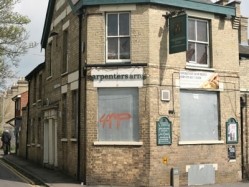One step forward, two steps back for campaigners seeking planning law protection for pubs

Cambridge MP Julian Huppert twice failed this week to secure a second reading of his Private Member's Bill which would have required the granting of planning permission before a change of use or demolition order was applied to any local shop or pub.
The failure comes less than a month after Cambridge City Council published new planning guidance, as a result of a public consultation, which sets out a list of criteria that will need to be met if development proposals leading to the loss of a pub on the city's 'safeguarded list' are to be approved.
However the British Beer and Pub Association (BBPA) has now questioned the legality of such guidance and said it does not back the council's approach, arguing it could actually lead to more pubs closing overall.
Welcome intent
"Our pubs are a vital part of the fabric of our communities not only for the part they play in our social lives but also in the historic importance of many of the buildings," Huppert said. "Once they close they are lost forever and that changes the face of our communities. I am committed to doing everything I can to stop this happening."
The MP has consistently fought to stop community pubs and shops from being demolished or having their use changed to make way for residential property.
However it seems the Local Services (Planning) Bill, which had been supported by Camra, will not now progress after being placed too far down Friday's House of Commons schedule to receive a hearing.
"I am encouraged, however, by the Government's attitude," Huppert said this week. "I was sent a letter from a Department for Communities and Local Government (DCLG) Minister, Don Foster, saying that 'We welcome the intent of the Bill, and I very much share your concerns that public houses, local shops and other facilities continue to close'.
"He went on to write that 'it is already our intention to protect these premises'," the MP added.
Legality questioned
If successful, the Bill would have brought local attempts to protect pubs from developers to a national level. Councillors in Kensington and Chelsea and Cambridge have both recently considered ways of supporting at-risk boozers.
However Cambridge City Council has been thwarted in its attempts after the BBPA called into question the legality of the recently-approved guidance.
A spokesperson for the organisation said: "For any freeholder, whether a large company or a single free house, it could be extremely damaging to have to keep certain pubs empty and closed for months. They would be unable to sell the premises and re-invest in other more viable pubs in the area. This could even lead to more pubs closing overall."
The BBPA believes the 'Community Right to Bid Powers' are a better option for local residents looking to save their local.
"These (Cambridge City Council plans) are completely contrary to the intention of the new National Planning Policy Framework introduced this year, to cut planning red tape for business," the spokesperson added.
Speaking to BigHospitality, a Cambridge City Council spokesperson refused to be drawn on the legality of the guidance but said 'Community Right to Bid Powers' were, as yet, unproven. He also admitted the guidance would not totally protect pubs but revealed the council was looking at ways to expand planning protection further.
Both the Cambridge proposals and the National Planning Policy Framework were highlighted in this week's House of Commons debate on the impact of the controversial beer duty escalator.














